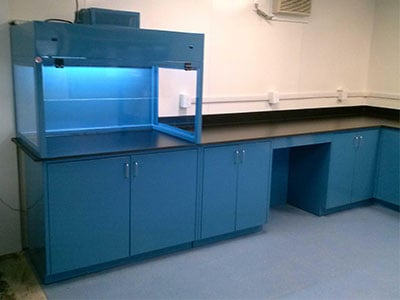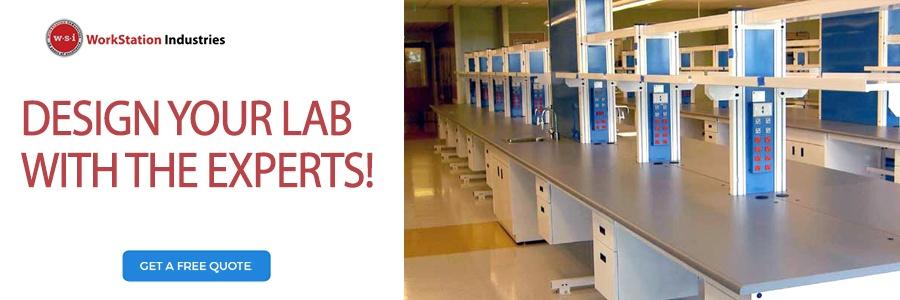Chemical fume hoods may be the most important piece of safety equipment that you purchase for your laboratory. They are designed to provide personnel protection from toxic or volatile chemicals by continuously delivering airflow away from your technician to the work area.
 They’ve been around awhile but as more organizations seek flexible lab designs, ductless fume hoods have gained traction in the laboratory furniture industry. Sometimes called carbon-filtered enclosures or filtered fume hoods, these units are self-contained, filtered laboratory enclosures that remove dirty air from fumes, particles and vapor, cleans it and delivers it back into the workspace.
They’ve been around awhile but as more organizations seek flexible lab designs, ductless fume hoods have gained traction in the laboratory furniture industry. Sometimes called carbon-filtered enclosures or filtered fume hoods, these units are self-contained, filtered laboratory enclosures that remove dirty air from fumes, particles and vapor, cleans it and delivers it back into the workspace.
Due to their lower overall cost, easier installation and the elimination of necessary ductwork within the building, ductless fume hoods are becoming a very popular choice
Sounds really good BUT: Is it right for your lab?
Ductless fume hoods certainly take care of chemical fumes, are cheaper than traditional ducted fume hoods and are easier to install, however they are not right for every situation.
Several factors must be taken into account before making a purchase. Today we take a look at a few of the considerations required before making a purchase.
What Chemicals Will Be Used in Your Fume Hood?
This is perhaps the most important question to be asked when selecting an appropriate fume hood. Even though there are different classes and types of ductless and filtered fume hoods, some limit the applications that can be performed in them.
Most ductless fume hoods should only be used as light-duty or process-specific fume hoods. Other filtered fume hoods can be used for a wide range of chemicals, but keep in mind that larger chemical volumes will always shorten filter life.
Prior to a purchase, it is recommended that a list of chemicals and the quantities that will be used in the hood should be developed to determine if the fume hood will be able to adequately handle your work load.
If you do not know what chemicals will be used in the future or have a very long list of chemicals, those applications may best be performed in a ducted fume hood application. Because worker safety is paramount, this should be your primary determining factor in the selection process.
What is The Overall Cost That Must Factor in to the Decision?
Another component that should be factored into your decision making is cost. Overall the cost of a ductless fume hood is cheaper than a ducted fume hood. Ducted fume hoods require very expensive infrastructure build outs including ducting, exhaust fans, mechanical systems and roof elements which can add up to a significant extra cost. The cost to operate them must also be factored in, since they require significant energy expenditures to run.
Ductless units are by no means free to run, since they require ongoing filter replacements, however over time they run more efficiently and represent a lower burden in maintenance and energy costs.
If however, you are heavily using the unit, or dealing with very toxic and noxious chemicals, the need for safety will trump any conversation around cost.
Flexibility
One of the primary benefits of the ductless fume hood is the ease of usage and the ability to move it within your facility. With modular laboratory furniture becoming one of the emerging trends in modern laboratory design, ductless fume hoods fit in perfectly with this growing trend.
They provide the user with the ability to literally plug and play which provides much needed flexibility allowing technicians to work at their highest capacity without being hampered by a rigid laboratory design.
Units can be relocated within your lab as your needs change by unplugging the unit, relocating it and then plugging it back in. For managers seeking a truly flexible lab environment ductless units certainly fit the bill.
User Operation and Education
One of the downsides of a ductless unit lies in its ongoing operation. A ductless unit requires the staff to not only become familiar with how to operate the unit from a safety perspective, but also to become familiar with the filtration system. Because the filtration system requires ongoing maintenance and replacement filters, someone within the organization must take ownership of ordering filters and ultimately replacing them at regular intervals.
There are certainly pros and cons of selecting the right unit for your organization. If you in the market for a new fume hood, it is important to take all these factors into consideration when deciding between a ductless or a ducted fume hood.
Chemical usage, overall cost, the need for flexibility and staff availability to care for the units are all things that must be factored in to determine the right type of fume hood for your lab.
Speaking with an expert to assess your needs and to help you determine the safest and most financially feasible decision is important. Make sure to do your research prior to making a final decision.


